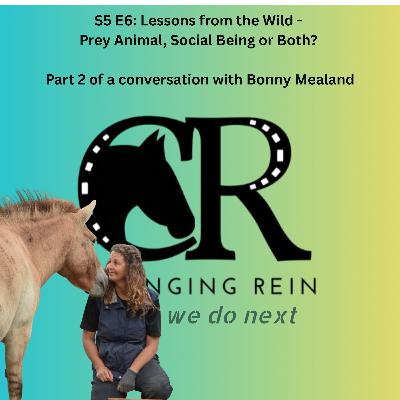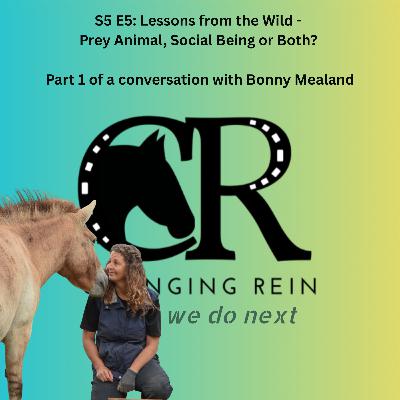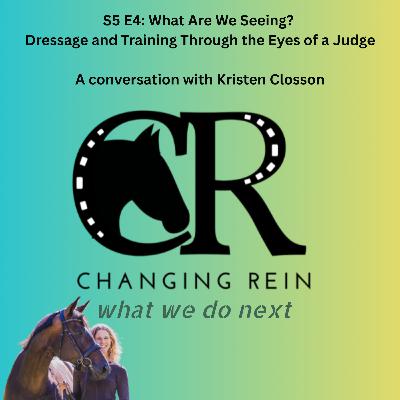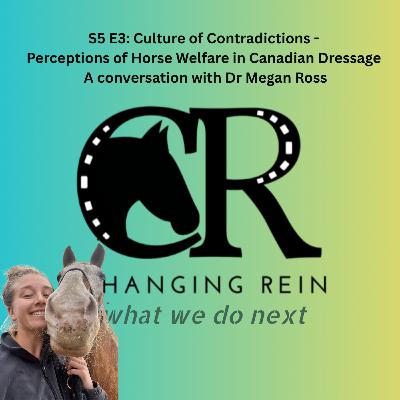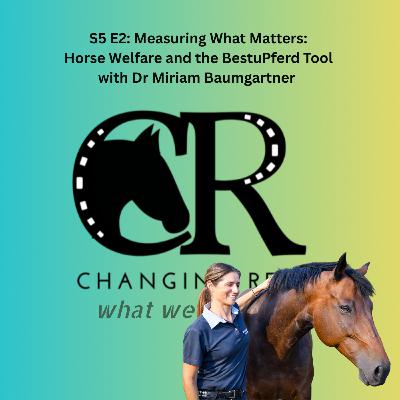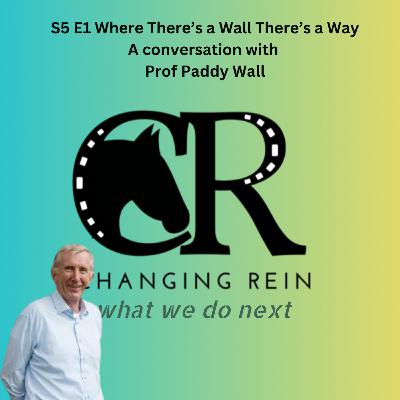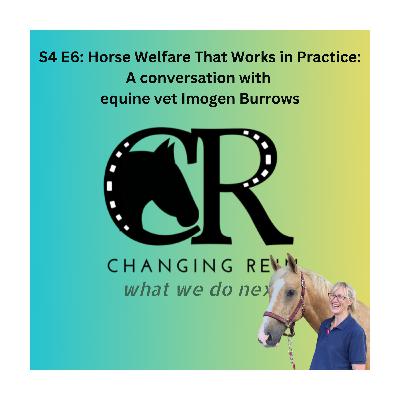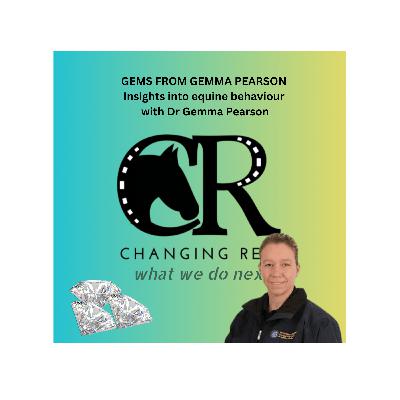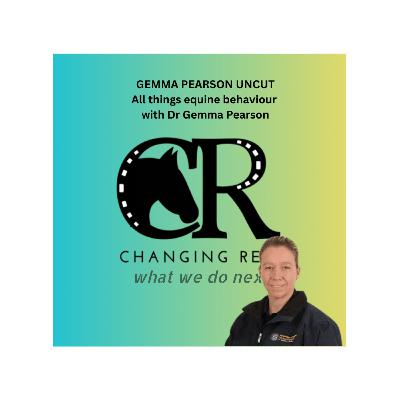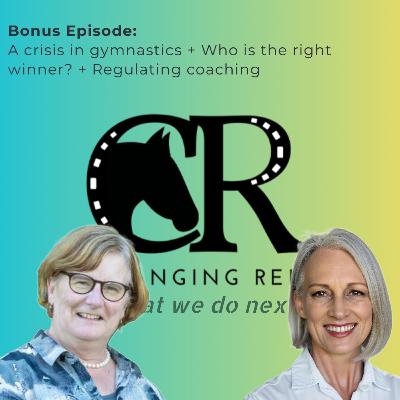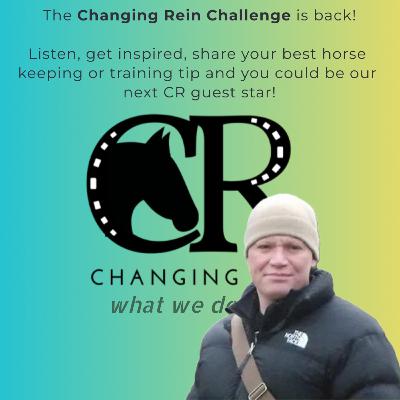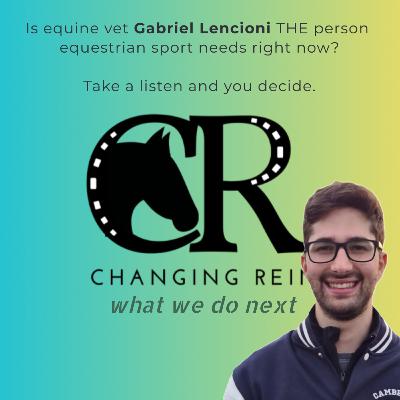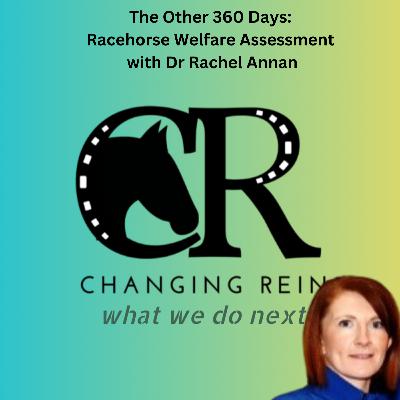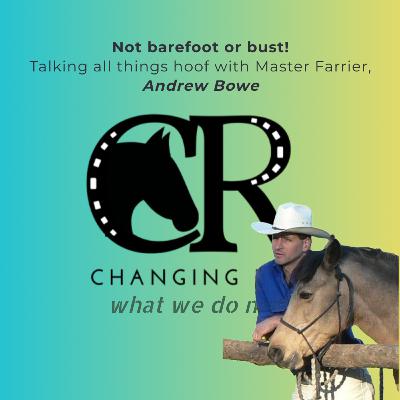Discover Changing Rein
Changing Rein

Changing Rein
Author: Karen Luke and Meta Osborne
Subscribed: 13Played: 179Subscribe
Share
© Karen Luke and Meta Osborne
Description
Join friends, Karen Luke and Meta Osborne, as they take a lighthearted and lively look into the serious task of making equestrian sport and racing sustainable into the future. The show's key ingredient is exploring new perspectives and not shying away from tough conversations. Curious to learn how leading scientists, jockeys, journalists and practitioners see future for horses in sport? Then buckle up for this fun adventure as we start Changing Rein!
40 Episodes
Reverse
We had so much to talk about that we split our chat with Bonny Mealand into two episodes which are interlinked. We discuss how free-living equids offer vital insights into the needs of domestic horses, and why recognising how essential these inextricable links between these two worlds is for the future of meaningful equine care.We explored how Bonny developed the HELP model which recognises that our presence, choices, and handling directly impact a horse’s emotional state and autonomy, leading to a focus on trust-based, low-stress approaches. Bonny firmly believes that when we slow down, learn to observe well and pay attention, horses begin to teach us, revealing insights we could never access through intellectual knowledge, techniques and method alone. Learning toobserve with care and curiosity allows horses to become our teachers, showing us what truly matters to them, helping us let go of assumptions and develop a more attuned, responsive, and respectful way of understanding and being withthem. We explore how Bonnie's insights can be applied to everyday interactions with horses and we learn about Bonnie's "genie wish", one that is probably shared by most of our guests and listeners. Tune in and let us know your thoughts!You can learn more aboutBonny’s work at these websites: Touching Wild: https://www.touchingwild.com/ Learning Wild: https://learningwilduk.wixsite.com/learningwild?fbclid=IwAR3NJULaSPPUZDXdBbiCOvankZ6zLSrU2AjdLlTyl3h8ju2RAVjgG6YfRzU The Equine Podiatry Association - https://www.epauk.org/?doing_wp_cron=1752481742.6105430126190185546875 Cristina Wilkins' online course mentioned by Bonny is available at this link: https://www.openlearning.com/une/courses/une-equine-course/?cl=1&redirectTo=https%3A%2F%2Fwww.openlearning.com%2Fune%2Fcourses%2Fune-equine-course%2Fhomepage%2F%3Fcl%3D1
SummaryIn Part 1 of our conversation with Bonny Mealand, she shares her journey into equine podiatry and the development of her HELP model, which emphasizes a holistic, horse-led approach to care. She discusses the importance of understanding horse behavior, building trust, and ensuring emotional safety in interactions. Bonny highlights the significance of observation in equine care and the important role of choice when developing meaningful relationships with horses. The conversation also touches on the challenges of rehabilitating traumatized horses and the potential for riding to be a positive shared experience when approached correctly.TakeawaysBonny's work focuses on a holistic approach to equine care.The HELP model emphasizes safety and relationship building with horses.Understanding horse behavior is crucial for effective interaction.Observation of free-living horses provides insights into their natural behavior.Building trust with horses takes time and patience.The importance of emotional safety in horse handling cannot be overstated.Rehabilitating traumatized horses requires a long-term commitment.The HELP wheel serves as a framework for horse-human relationships.Touch should be initiated by the horse to ensure comfort.Riding can be a part of the relationship if approached correctly.
Kristen Closson possesses a unique trifecta of expertise. As a rider that knows how it should feel, a coach who knows how to create it, and a judge who knows how to assess it. She has successfully competed through the FEI levels, and then diversified her attention to also include the coaching and the judging aspects of the sport. She assists riders of all levels from young riders to International Grand Prix riders with her keen eye.Kristen is remains active in education and sports administration, and holds two committee seats at Equestrian NSW, as well as being a coach educator and a judge educator. In this episode we discuss promoting harmony in dressage through learning how to ask questions and interpret answers, and the role our self awareness plays in this ability.You can learn more about Kristen's work on her website https://www.clossondressage.com/
Karen and Meta share an interest in Systems Thinking and its potential applications to horse welfare in sport. So when Dr Megan Ross and her co-authors published a paper on wicked problems and systemic issues in Canadian dressage she had to be a podcast guest!Dr Megan Ross has a background in dressage and eventing. She has an applied science degree from the University of British Columbia with a focus on Animal Welfare and has applied this background (and Pilates certification) as a trainer and riding instructor to support the horse-rider dyad. She recently completed a PhD at the Atlantic Veterinary College and the University of Prince Edward Islandunder the supervision of Dr. Caroline Ritter and Dr. Kathryn Proudfoot. Her research focused on the human dimension of horse well-being/welfare, exploring owners’ perspectives of horse welfare in their daily life like management andtraining. She is now conducting postdoctoral research with Dr. Katrina Merkies at the University of Guelph assessing the influence of interventions on rider and horse behaviour during lessons. Link to the paper discussed in the episodehttps://www.researchgate.net/publication/388845023_A_wicked_problem_Systemic_issues_surrounding_Canadian_equestrian_dressage_and_dressage_horse_welfare The map of the issues mentioned by Megan in the episode is available atthis link:https://static.cambridge.org/content/id/urn%3Acambridge.org%3Aid%3Aarticle%3AS0962728625000028/resource/name/S0962728625000028sup001.pdf
Dr. Miriam Baumgartner is a veterinarian and equine scientist with over 15 years of experience researching horse-friendly husbandry. Her work focuses on how equine behavior and health reflect their living conditions, aiming to improve welfare and sustainability in horse management.Miriam earned her doctorate in 2012 from the Ludwig Maximilian University of Munich (LMU) in the field of ethology, animal husbandry, and animal welfare, specializing in the lying behavior of horses in open housing systems. From 2013to 2017, she contributed as a researcher at the Technical University of Munich-Weihenstephan, working on the Weihenstephaner evaluation system, for which she was awarded the Boehringer-Ingelheim Animal Welfare Medal in 2015. In addition to her academic endeavors, she gained practical experience as an equine veterinarian from 2010 to 2015.Between 2018 and 2021, Miriam led the development of the BestTUPferd project, a collaborative research initiative based on her previous studies, aimed at developing an assessment system for evaluating animal welfare and environmental impacts in horse husbandry.Since 2022, she has been a senior scientist in the Equine Team at Agroscope, working at the Swiss National Stud Farm, where she continues her dedication to advancing sustainable and welfare-friendly horse management practices. In 2025, she completed her habilitation on the topic: "Animal welfare in horse husbandry – how to measure, assess, and improve? Development of indicators for evaluating the welfare compliance of horse husbandry systems with regard to validity, reliability, and practicality as a basis for a digital advisory tool."Miriam's research output is available at this link: https://www.researchgate.net/profile/Miriam-BaumgartnerIf you would like a complete list of her publications, email us at team@changingrein.com.au
In this episode we chat with Prof Paddy Wall about his recently published report into the scandal involving a horse abattoir in Ireland in 2024.Prof Wall is a vet and medical doctor and has awide-ranging resumé with contributions spanning public health, food safety, governance and education. He was the first Chief Executive of the Food Safety Authority of Ireland and has held senior positions on international food safety bodies including the European Food Safety Authority. He is Professor of Public Health at University College Dublin. He has further qualifications in infectious diseases, business administration and corporate governance. A keen horseman, Paddy has shown and judged young horses, produced riding horses for the Ridden Hunter classes, participated in hunter trials and one-day-event competitions, and ridden in Point-to-Points. He was co-author of the 2010 UCD report on Horse Welfare in Ireland commissioned by World Horse Welfare and was chairman of Horse Sport Ireland from 2013-2016.In 2024 the Irish national broadcaster, RTÉ, screened an investigative documentary which alleged potentiallysignificant animal welfare breaches and fraud at Ireland’s only equine abattoir which was under the supervision of the Department of Agriculture, Food and the Marine (DAFM). In the wake of this documentary Paddy was asked by DAFM to carry out a review of the issues highlighted in the documentary, particularly around equine identification and traceability. The report was published in March 2025 and is available at this link.The report was accompanied by an ActionPlan from DAFM setting out proposals to implement the recommendations of the Wall report.
Equine vets are at the heart ofequine welfare - working with owners to provide optimal health care and management whilst always striving to put the needs of the horse first.Our guest in this episode is equine vet Imogen Burrows, who graduated from the Royal Veterinary College in 2000. She is an equine first opinion vet in ambulatory practice and isthe current President-Elect of the British Equine Veterinary Association(BEVA). She is a Member of the BEVA Education Committee and chairs theirEthics and Welfare Committee. She also represents BEVA on the BritishVeterinary Association Animals in Performance Sport Working Group. Imogen’s professional interestsinclude animal welfare and ethics; education; clinical governance; internalmedicine; anaesthesia; ophthalmology and stud medicine. We felt that Imogen was ideallyplaced to chat about how equine vets navigate the complex landscape of equinewelfare, and we weren't disappointed - she packed so much wit, wisdom andpractical insights into our chat that the time just flew!Outside of work Imogen enjoys the outdoors:walking/mountaineering; skiing; scuba diving and more. And if you live in EastSussex or Kent you may come across her expressing her love of music by playingin brass bands!
Our guest Dr Gemma Pearson has so much to say that we decided to offer her episode in two versions - this one is the condensed version, in which Gemma discusses the highlights of her journey in equine behavioural medicine.In her current roles, Gemma combines her time between research and outreach as Director of Equine Behaviour at The Horse Trust and running a referral clinic for clinical equine behaviour cases where she is based at the University of Edinburgh.After working in ambulatory practice Gemma undertook a rotating residency programme in the equine hospital alongside an MScR investigating horse veterinarian interactions.Subsequently she completed her CCAB (certified clinical animal behaviourist) exam and her PhD thesis ‘Stress in equids undergoing veterinary care and the development of interventions that positively influence the horses’ experience’. As well as continuing with her own research she supervises several students at PhD, MSc and undergraduate level. Subsequently she has been recognised as the first species specific RCVS specialist in Veterinary Behavioural Medicine (Equine).Gemma is frequently invited to lecture internationally, as a recognised expert in this field and an excellent communicator. One of the most successful projects was filming a series of short YouTube videos with the British Equine Veterinary Association aiming to reduce injury rates when dealing with difficult horses under the ‘Don’t break your vet’ campaign.In her spare time she has competed up to advanced level endurance on a homebred horse as well as enjoying competing in affiliated dressage and eventing. Currently she is retraining a Thoroughbred recently retired from racing.Gemma's research output is available at this link:https://www.researchgate.net/profile/Gemma-Pearson-2/research
Our guest Dr Gemma Pearson has so much to say that we decided to offer her episode in two versions - this one is the extended version, in which Gemma discusses with us her journey to equine behavioural medicine and her current roles, combining her time between research and outreach as Director of Equine Behaviour at The Horse Trust and running a referral clinic for clinical equine behaviour cases where she is based at the University of Edinburgh.After working in ambulatory practice Gemma undertook a rotating residency programme in the equine hospital alongside an MScR investigating horse veterinarian interactions.Subsequently she completed her CCAB (certified clinical animal behaviourist) exam and her PhD thesis ‘Stress in equids undergoing veterinary care and the development of interventions that positively influence the horses’ experience’. As well as continuing with her own research she supervises several students at PhD, MSc and undergraduate level. Subsequently she has been recognised as the first species specific RCVS specialist in Veterinary Behavioural Medicine (Equine).Gemma is frequently invited to lecture internationally, as a recognised expert in this field and an excellent communicator. One of the most successful projects was filming a series of short YouTube videos with the British Equine Veterinary Association aiming to reduce injury rates when dealing with difficult horses under the ‘Don’t break your vet’ campaign.In her spare time she has competed up to advanced level endurance on a homebred horse as well as enjoying competing in affiliated dressage and eventing. Currently she is retraining a Thoroughbred recently retired from racing.Gemma's research output is available at this link:https://www.researchgate.net/profile/Gemma-Pearson-2/research
This week, Karen and Meta discuss two recent events, and what they found interesting and potentially helpful in building a better future for equestrian sport.We discuss World Horse Welfare's recent virtual conference titled:"Accountability for welfare in equestrianism: Looking beyond the obvious"https://www.worldhorsewelfare.org/accountability-for-welfare-in-equestrianism-looking-beyond-the-obviousAnd also the latest offering from the Teagasc series, Let's Talk Equine, featuring our own Meta Osborne.https://www.teagasc.ie/rural-economy/rural-development/equine/lets-talk-equine-webinar-series/We hope you enjoy this bonus, and as always, reach out and share your thoughts and opinions and ideas for the future.Our email is: team@changingrein.com.au
Will you be our next Changing Rein guest star?Read on to learn how!This week we are replaying an episode that many of our listeners ranked as their favourite - our chat with the endangered species specialist - Dr Jake Veasey.We are replaying part 2 of our chat where he talks about using his approach to understanding animal welfare to design habitat for tigers that is enriching and helps them thrive, even while living in captivity.The Changing Rein Challenge is back!!!So what's the challenge?Jake's ideas really inspired us, and we hope you were inspired too. We are asking you to listen to Jake's episode, and see if it inspires you to think of some change we could implement to make our horse's lives better. Or maybe you already do something clever that you can share with us. The goal is to share ideas around so we can make life better for our horses and better for us too.Please take up the challenge - we really can't wait to hear from you - and send us an audio clip so we can play your idea on an episode of Changing Rein.To record your clip, go to our Changing Rein Facebook page and send us an audio message.We hope you enjoy re-listening to the incredible Jake Veasey as much as we did, and we can't wait to hear your tips about how you make life better for your horse.
Gabriel Lencioni is a young, equine vet with an interest in horse welfare and behaviour.
Recently qualified, Gabriel is already embarking on research that just might change the way we think about horse welfare in equestrian sport - he is creating an AI model to assess horse welfare during competition.
Not your regular AI tech-bro, Gabriel shares with us his journey into animal behavior and welfare, and why he is determined to leverage the latest technology to improve the lives of horses, vets and owners.
As our first guest from South America, we also explore cultural perspectives on animal welfare, and as always, we talk about how optimistic we are the future of horse sports.
Reading and Resources
Find all of Gabriel's research here
The Cambridge Declaration on Consciousness (2012)
An integrative and functional framework for the study of animal emotion and mood (Mendl et al, 2010)
Rachel is both a racing 'insider' and an academic - she has worked in horse racing for over 20 years and she obtained her PhD from the University of Bristol in 2023 for her work developing a racehorse welfare assessment protocol.
This welfare assessment has been trialled by industry assessors to gather population level racehorse welfare data. The welfare assessment has also been used to monitor the welfare of Military Working horses from the Household Cavalry and racehorses in Hong Kong.
In this episode we talk about the practicalities of racehorse welfare assessment, the small changes that can result in big improvements, and the importance how young Thoroughbreds are managemed on stud farms to set them up for a good life in racing.
Rachel is currently an Equine Technologist at CAFRE (College of Agriculture, Food and Rural Affairs) in Enniskillen, Northern Ireland and is a post-doctoral researcher at University College Dublin (UCD).
Rachel's research output is available on ResearchGate
In this episode, Master Farrier Andrew Bowe discusses his journey from traditional farriery to a focus on barefoot hoof care.
He shares insights on treating chronic conditions like laminitis and navicular disease, the ethical considerations of hoof care, and the importance of educating horse owners.
The conversation also covers performance solutions for horses, the significance of farrier care, and the future of hoof care regulation. Andrew emphasizes the need for a mixed approach to hoof care, combining traditional and modern methods for optimal horse health.
At their farm, Mayfield, Andrew and wife Nicky host the Australian College of Equine Podiotherapy where they train the next generation of equine hoof care practitioners, plus they also offer a lameness rehab and retirement agistment facility. In addition, at Mayfield and at locations around Australia they offer maintenance hoof care workshops so owners can learn how to safely care for their horse's feet in between farrier visits.
Visit Andrew's website here: https://barehoofcare.com/
For our extended
bumper Christmas edition we have a very special guest, Dr Mette Uldahl.
Mette is a Danish veterinarian who until earlier this year was veterinary advisor to the Danish Equestrian Federation. She resigned from that role in September 2024 and is now chief consultant to Dyrenes Beskyttelse (Animal Protection Denmark). Mette has devoted her career to being a voice for animals. As well as her work with DEF, Mette is
a Past President of the Federation of European Equine Veterinary Associations and is currently 1st Vice President of the European Veterinary Association.
Mette also regularly take part in research projects and publications of peer-reviewed papers, many of which she discusses in this episode.
This episode is particularly fitting as we wind down to the
holiday season because Mette touches on so many of the topics that have been raised by the guests on Changing Rein over the past six months. What is more Mette brings her own unique perspective, whether it is thinking about horse behaviour
through understanding neurodiversity, or the language we use about and around horses and its impact on welfare. How should vets balance their roles as advocates for horses while also having to satisfy client demands and expectations? What is the intrinsic value of horses? And if we are to use horses in sport, how much compromise is acceptable? And we touch on the mind games we play in our interactions with horses, we talk about blue tongues and oral lesions and knee rolls, we discuss the role of governing bodies, and Mette shares her profound wish for horse sport into the future.
We hope that wherever you are that you enjoy this extended
edition of Changing Rein and we look forward to continuing our journey with the podcast and our listeners in 2025.
You can find Mette’s research output at https://www.researchgate.net/profile/Mette-Uldahl
Life with horses is complicated, because we take on responsibility for another sentient being- and if we humans want to improve horse welfare, we need to find common ground with one another.
Tamzin Furtado BA(Hons), AdvDip, PhD is a social scientist with a background in global health, and a specific interest in the interconnections between human and animal health, and well-being.
She completed a PhD at the University of Liverpool studying human behaviour change in relation to obesity in horses, particularly focusing on horse-human relationships. Tamzin works on projects across the equine welfare spectrum, including: studying people’s perceptions of sport horse wellbeing, livery yard management, and anthelmintic resistance.
In this episode we talk about barriers and enablers of change, at both individual level and organisational leve. We also hear about Tamzin's novel work on the tricky topic of equine obesity. We discuss the welfare of livery yard owners and managers, and we chat about uncertainty.
Tamzin’s publications can be found at this link
https://www.researchgate.net/profile/Tamzin-Furtado
Should riding bit-free be an option for all equestrian sports?
Should racing include whipping horses to make them run?
What is the most important project in the realm of sport horse welfare right now?
Listen to this episode of Changing Rein and find out from arguably the world's most influential person in horse sport welfare, Roly Owers, CEO of World Horse Welfare (WHW).
Roly Owers has huge influence in sport horse welfare because alongside his World Horse Welfare CEO role, he is a director of British Equestrian the peak body for equestrian sport in Britain, and affiliated with the FEI. Plus he is an advisor to other national and international organisations including the British Horseracing Authority and the International Horse Sports Confederation
What he says matters!
Think all the fuss about horse welfare is overblown?
Or maybe you think the opposite, that not enough is being done...either way you want to know what Roly Owers thinks.
Our conversation covers not only the important changes we have seen in sport horse welfare but what is needed in the future. There are some predictable bits and some surprises...but don't take our word for it...jump in and have a listen!
We're taking a few weeks break, and we'll be back before you know it with some great guests and great new content. Before that we thought we'd share with you some of the highlights of Season 2 - now is your opportunity to catch up on listening to some really interesting guests discussing all things horse sport and equine welfare. Thanks for sharing our journey - and be sure to share with your friends how much you are enjoying Changing Rein!
Dr Jo Hockenhull is Head of Research at The Donkey
Sanctuary. Jo has had a wide-ranging and varied career in animal welfare science – her particular interests include horse behaviour and welfare, human-animal interactions and the possibilities inherent in the science of Human Behaviour Change to improve the welfare of animals.
Jo’s research output can be found at this link:
https://www.researchgate.net/profile/Jo-Hockenhull/research
Dr Jo Hockenhull is Head of Research at The Donkey
Sanctuary.
Jo has had a wide-ranging and varied career in animal welfare science – her particular interests include horse behaviour and welfare, human-animal interactions and the possibilities inherent in the science of Human Behaviour Change to improve the welfare of animals.
Jo’s research output can be found at this link:
https://www.researchgate.net/profile/Jo-Hockenhull/research
Background - about Meredith
Meredith Chapman was appointed as Equestrian Australia's (EA) first National Health and Safety Manager. This role was actioned following the tragic deaths of two young eventing horse riders in 2016. Meredith’s primary role was to lead the implementation of all 31 coronial recommendations following a coronial inquest. Meredith worked extensively with all Australian State, Territory, and disciplines specific committee representatives, including the Olympic High-Performance executive team reviewing, developing, and implementing improved Health, Safety, and Welfare (HSW) management systems, whilst maintaining sport operations. Her role required extensive consultation, evidence-based research for best-practice standards, cultural and industry change management, widespread member and stakeholder engagement and training.
Meredith developed EAs first National HSW policies, a Minimal Medical Response Framework, post incident response and crisis management plans, concussion in sport protocols and she navigated EA through the COVID pandemic. Meredith represented EA at 3 annual international FEI conferences,l and various stakeholder meetings. Meredith also developed and hosted EA first on-line National HSW conferences (2021 & 2023).
Meredith’s business management experience and academic achievements have enabled her to maintain regulatory (Australian Sports Commission), EA Board and HSW committee communications on all matters pertaining to equestrianism HSW as required. Following Voluntary Administration, she was influential in re-establishing EAs stakeholder funding and resuming sport operations. Meredith participated EA recruitment, management and training of new team members, was accountable for HSW reports, budgets, identification of training needs, insurance and legal liaison, the development and delivery of safety compliance management processes and more. Meredith has provided expert HSW leadership to assist EA in achieving a nationally aligned strategy during structural reform.
You'll find Meredith's academic publications on Researchgate


